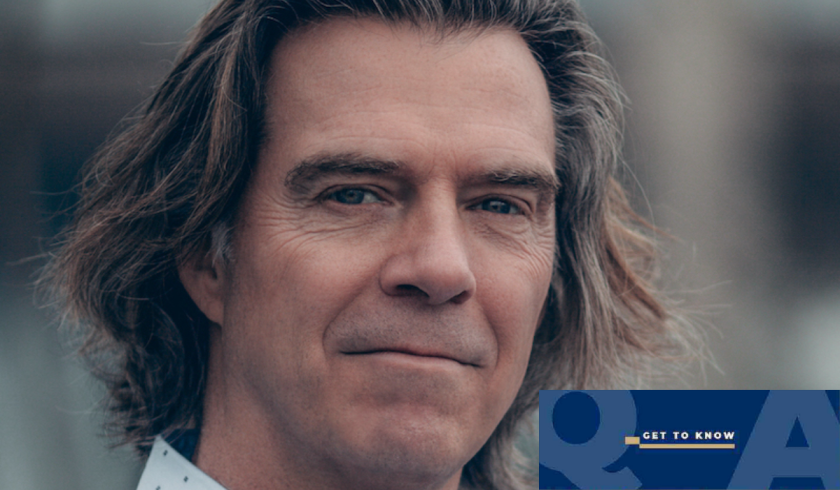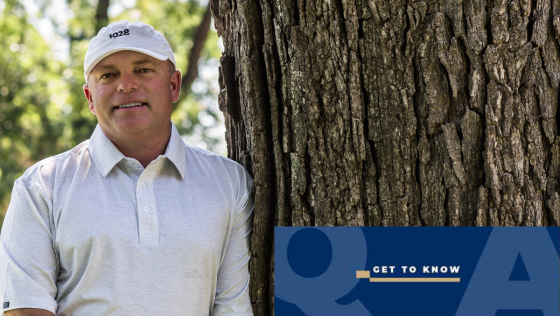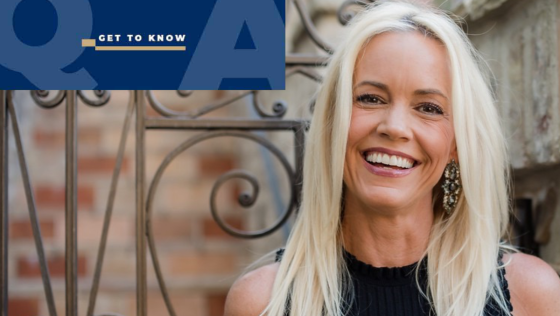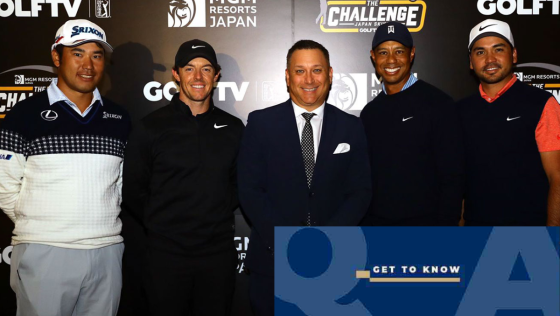
Colin Weston is co-founder of Reviver Sport Entertainment, along with being the creator and host of “The ModGolf Podcast.” He tells of his circuitous route into golf, what he's learned and why listening is such a valuable trait.
The First Call: Please give us a short overview of your company.
Colin Weston: “The ModGolf Podcast” talks with golf's top influencers, entrepreneurs, innovators and disruptors about their visions and solutions to reimagine, transform and enhance the game. “The ModGolf Podcast” is a media asset of Reviver Sport Entertainment that was created to help build community and to give under-represented golf industry entrepreneurs a platform to share their story.
TFC: What is your handicap index?
CW: 16. Sadly it's gone up from a 13 in the past year.
TFC: In one sentence, describe what you do for a living.
CW: I'm a community builder, sports tech entrepreneur, experience designer, public speaker, social impact startup supporter, innovation junkie and educator.
TFC: What time do you wake in the morning, and what time do you typically start the workday?
CW: Being an entrepreneur and content creator means that I don't adhere to a 9-to-5 lifestyle, so I do need to create some structure around my day, which starts with waking up at 6:30 every morning. COVID has thrown a wrench into the rhythm of my workflow, so every day is different depending upon what I have scheduled. The three days a week that I have a morning tee time means I'll work starting in the afternoon and late into the evening. Non-golf days start with yoga or strength training before starting the work day with emails around 9 a.m.
TFC: What are key elements to leadership or to being a good leader?
CW: Great question, as we talk about this a lot on “The ModGolf Podcast.” Strong leaders/entrepreneurs/founders all process most or all of these traits: resilience, curiosity, courage, positivity, empathy, patience and the ability to listen. Surround yourself with smart, vibrant people, then empower them so they are engaged in the journey of creating products/services/experiences that deliver a solution to your customer's problem.
TFC: What changes, if any, have you made based on the events of the past year?
CW: Not traveling and unable to gather for events meant that I had to reimagine our business model, delivery process, value proposition and strategic priorities for both “The ModGolf Podcast” and Reviver Sport Entertainment. Reviver was in full product development of our "Topgolf of putting" golf tech venture when COVID hit, which resulted in our potential customers and investors hitting pause. Rather than give up on bringing Aces Gameplay Golf to market, we recalibrated our effort and energy to focus on building the partnerships and strengthen our technical delivery team over the past 12 months. Taking our foot off the gas rather than pushing aimlessly forward now allows us to deliver our first Aces putting experience in 2022 as the world opens back up.
TFC: What's the secret to your success?
CW: First and foremost, talk less and listen more. Ask questions. Stay curious. This is a skill that can be learned over time and strengthened like a muscle. I've gotten my reps in by hosting 110-plus podcast episodes and 100-plus events. If I can do it, so can you. Shedding the stigma of failure and reframing my definition of success is one of the most liberating outcomes entrepreneurship has provided.
Since childhood we are conditioned to feel shame around failure and losing, which precludes us from taking risk with no guaranteed positive result. To quote NHL G.O.A.T. Wayne Gretzky: “You miss one hundred percent of the shots you don't take.” I now approach every venture I take on as an experiment and learning opportunity, rather than a black or white, pass or fail situation. Reading Eric Ries' “The Lean Startup” opened my eyes to creating a minimum viable product that you put out there to receive user feedback — both good and bad. Creating a build-test-measure-learn feedback loop to quickly determine what's working allows me enhance what people like, reduce or eliminate what they don't and test new features to create even greater value. I have applied this iterative-design approach to product development, community building and podcasting. If you want to go fast, go alone. But if you want to go far, go together. The power of partnerships is critically important if you want to scale your efforts. We all have strengths and weaknesses, so focus on what you do best and reach out to others who can help fill the gaps.
TFC: Who is your role model?
CW: I saw Simon Sinek's “How Leaders Inspire Action” TED Talks right when I was starting my entrepreneurial journey and his “it's not what we do but why we do it” mantra still resonates with me today and influences my views on culture and community building. I've done 115 episodes of “The ModGolf Podcast,” which has bestowed upon me the gift of 115 stories, 115 world views and 115 micro-mentoring moments. I have learned something unique and insightful from each guest and look at the majority of them as role models. One of the side benefits of hosting a podcast is meeting new people who, over time, become good friends.
TFC: Knowing what you know today, what professional advice would you give a younger you?
CW: For starters, be more generous, kind and forgiving to myself. Negative outcomes in sport and life led to a lot of self-doubt and criticism, which held me back. During my academic years, I was a procrastinator combined with a perfectionist, which is the worst combo ever. I'd always hand A-grade assignments in late because I didn't think they were good enough when they were due. Becoming an entrepreneur forced me to unlearn these traits and habits, allowing me to embrace a “ship it and see what happens” mindset. Talk less and do more. The act of creation is the best way to learn. Surround yourself with smart, interesting, energetic people. We are the product of those people we interact with, so circulate with amazing humans who inspire you to be a better version of yourself.
TFC: What’s the last book you read?
CW: For business — “Sprint: How To Solve Big Problems And Test New Ideas In Just Five Days” by Jake Knapp from Google Ventures. For personal growth — “Buddhism: A Very Short Introduction” by Damien Keown. For pleasure: “Outliers” by Malcolm Gladwell.
TFC: What’s the last movie you saw?
CW: David Byrne's “American Utopia.”
TFC: What’s on your playlist?
CW: R&B, jazz and 80s alternative. Beck. The Flaming Lips. Jamiroquai. The Beastie Boys. And lots of David Bowie.
TFC: When I’m not at work, you can find me …
CW: With a club in my hand, on a snowboard, on a paddle board, in a hot yoga class or spending time with friends and family. I also volunteer to support under-represented entrepreneurs and youth mental health advocacy.
TFC: What is your greatest extravagance?
CW: Taking extended periods of time off to travel. I will take experiential over material extravagance every time.
TFC: What was your path to the golf industry?
CW: Definitely a circuitous one. I was an architect for the first half of my professional career, with a focus on sport stadium and venue design that included Olympic and Pan-Am Games fan experience design work. I played golf (poorly) for over 30 years before an entrepreneurial aha moment hit in 2012. I recognized all the pain points the golf industry was suffering from as rounds played had dropped by 25% — too hard to learn, takes too much time, expensive equipment, too stuffy and conservative, not welcoming. We co-founded Reviver Sport Entertainment as a response to the gaps and opportunities we saw, especially with golf. We first created RippedLinks, which is a mobile X Games / American Ninja Warrior golf-event tour with a three-hole, par-3 competition format that drops in the middle of a city, urban beach or resort property. We spent the next couple of years moving RippedLinks forward and although we didn't stage a full event as we had hoped, I met a lot of influential golf industry players that saw the potential in us and our ideas.
In 2015, I was introduced to Topgolf chairman Erik Anderson. Topgolf was looking to invest in or acquire the RippedLinks property, but after a year of negotiation the deal didn't come together. The silver lining was that Erik and his leadership team believed in our entrepreneurial mindset, so they hired us as design consultants to envision and create what became the Topgolf Crush mobile stadium activations. Building on this success, I researched golf podcasts in mid-2016 and realized no one was telling entrepreneurship and innovation stories in our $85 billion-a-year industry. I approached this as an opportunity to create community around the future of golf as an experiment, asking friends and acquaintances in the industry if they'd be willing to be a guest on this podcast that didn't exist yet. Many of them jumped on board and in May 2017 "The ModGolf Podcast” launched its first episode.
TFC: What are the favorite golf courses you have played?
CW: Chambers Bay, south of Seattle, and Point Grey, in Vancouver. Heading to Bandon Dunes for the first time in early 2022, so I'm sure that will be added to the list.
TFC: Which golf courses do you belong to?
CW: I'm a member of The University Golf Club Weekend Men's Group in Vancouver, Canada. If you're ever in Vancouver, let's get together for a round on this beautiful and challenging 1929 course.










